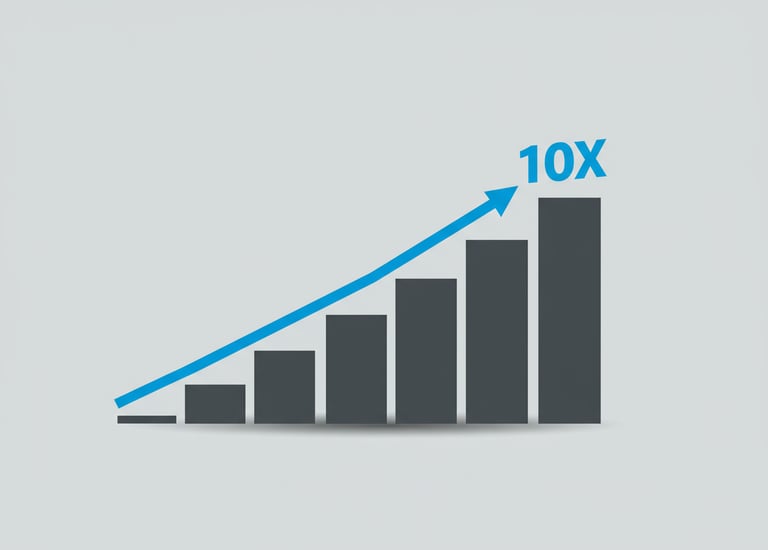Why Finance Process Optimization is Critical for Growing Companies
Automate financial workflows, eliminate manual tasks, and build scalable systems that grow with your European startup or scale-up.
Manual financial processes that work at €2M ARR become bottlenecks at €10M+ ARR. Build systems that scale.


Efficiency Gains
Eliminate 60-80% of manual financial tasks through smart automation and streamlined workflows


Real-time Visibility
Automated reporting and dashboards that provide instant insights into financial performance




Improved Controls
Better accuracy, audit trails, and compliance through systematic process design
Scalable Growth
Systems that handle 10x revenue growth without proportional increases in finance headcount
Finance Process Optimization Questions
How do I automate financial processes for my growing startup?
Financial automation for startups should be systematic and strategic, not just about buying software. From my experience working with European companies since 2018, successful automation follows a clear priority framework.
Phase 1: Foundation automation (first 3 months):
Accounts payable: Automated invoice processing, approval workflows, payment scheduling
Expense management: Mobile receipt capture, automated categorization, real-time reporting
Bank reconciliation: Automated matching, exception handling, daily close processes
Revenue recognition: Subscription billing automation, deferred revenue calculations
Phase 2: Strategic automation (months 4-6):
Financial reporting: Automated monthly close, standardized report generation
Budget management: Real-time budget tracking, variance alerts, spend approvals
Cash flow forecasting: Automated 13-week rolling forecasts with scenario modeling
KPI dashboards: Real-time metrics for management and investors
Critical success factors:
Start with processes that consume the most manual time
Ensure data quality before automation (garbage in, garbage out)
Train teams properly and create fallback procedures
Measure ROI through time savings and error reduction
Key insight: Companies that automate systematically see 60-80% reduction in manual financial tasks and can scale revenue 5-10x without proportional finance team growth.
What financial processes should I prioritize for optimization first?
Process optimization should start with the biggest pain points that consume time and create errors. Based on my experience with European startups, here's the priority framework that delivers maximum impact:
High-impact, quick wins (implement first):
Expense management: Automated receipt capture and categorization (saves 5-10 hours/week)
Invoice processing: OCR scanning, automated approval workflows, payment scheduling
Bank reconciliation: Automated matching reduces month-end close from days to hours
Payroll processing: Automated calculations, tax compliance, benefit deductions
Medium-term strategic optimizations:
Revenue operations: Subscription billing, revenue recognition, customer lifecycle automation
Financial reporting: Automated monthly close, standardized investor reports
Budget management: Real-time tracking, approval workflows, variance analysis
Procurement: Purchase order workflows, vendor management, spend approvals
Advanced optimization (after foundation is solid):
Forecasting automation: Rolling cash flow models, scenario planning
Management reporting: Real-time dashboards, KPI automation, board packages
Compliance automation: Tax filing, regulatory reporting, audit preparation
ROI prioritization framework:
Time savings: How many hours per week does this process currently consume?
Error reduction: How often do manual errors occur and what's the cost?
Scalability: Will this process break as you grow 3-5x?
Implementation complexity: How quickly can you implement and see results?
Practical approach: Start with expense management and invoice processing - these typically deliver immediate time savings of 10-15 hours per week and can be implemented within 2-4 weeks.
Which financial tools should my European startup use for process optimization?
The European startup financial tech stack should balance functionality, cost, and compliance requirements. Based on my experience implementing systems for companies across DACH region, here's what works best:
Core accounting and ERP:
DATEV: Essential for German companies, handles local tax compliance and accounting standards
NetSuite: Excellent for international operations and scaling companies (€5M+ ARR)
Xero: User-friendly for smaller startups, good API integrations
sevDesk: German all-in-one solution with receipt recognition and DATEV integration
Lexware: Traditional German provider with strong accounting integration
Expense management and AP automation:
Expensify: Excellent mobile app, automated receipt processing
Concur: Enterprise-grade for larger teams and complex travel policies
Rydoo: European-focused, good for multi-country operations
CANDIS: German AP automation with AI-based invoice processing
Circula: German travel expense accounting with mobile receipt scanning
Banking and payments:
Kontist: German startup-friendly banking with automated categorization
Qonto: Multi-country European business banking
Revolut Business: Great for international payments and FX
SEPA solutions: Essential for EU operations and vendor payments
Financial planning and analysis:
Jedox: European-based, excellent for budgeting and forecasting
Anaplan: Advanced planning for larger scale-ups
Board: Strong for complex financial modeling
Excel/Google Sheets: Still relevant for custom models and startup flexibility
Implementation strategy by company stage:
€0-2M ARR: Basic stack (Xero + Expensify + Kontist) - €200-400/month
€2-10M ARR: Intermediate stack (DATEV + Concur + Qonto + Jedox) - €800-1,500/month
€10M+ ARR: Enterprise stack (NetSuite + full automation suite) - €2,000-5,000/month
Key principle: Don't over-engineer early. Start with 2-3 core tools that solve your biggest pain points, then add complexity as you scale. The best system is the one your team actually uses consistently.
What's the ROI of finance process optimization for my startup?
Finance process optimization ROI goes far beyond simple cost savings - it's about enabling faster growth, better decision-making, and reduced risk. Here's how to calculate and maximize the return:
Direct cost savings (quantifiable):
Time savings: 60-80% reduction in manual tasks (typically 15-25 hours/week for €5M ARR company)
Error reduction: 50-70% fewer processing errors and associated correction costs
Delayed hiring: Can scale 3-5x revenue before needing additional finance FTEs
Faster close: Reduce month-end from 10+ days to 3-5 days, enabling faster decisions
Strategic value creation (harder to quantify but often more valuable):
Investor readiness: Clean, automated processes increase company valuation and funding speed
Management insight: Real-time financial data enables better strategic decisions
Compliance confidence: Reduced audit costs and regulatory risk
Operational focus: Finance team can focus on analysis instead of data entry
Typical ROI calculations for European startups:
€2-5M ARR company example:
Investment: €50,000-80,000 for tools and implementation
Annual savings: €120,000-150,000 (avoided hiring + efficiency gains)
Payback period: 6-9 months
3-year ROI: 300-400%
Ready to Optimize Your Financial Processes?
Get a comprehensive process assessment and automation roadmap tailored to your company's growth stage.
45-minute analysis • Immediate efficiency recommendations • Custom automation roadmap
Strategic support for small businesses and startups.
Contact
© 2025. All rights reserved.
Meeting
Book a 30-minute introductory meeting directly:


